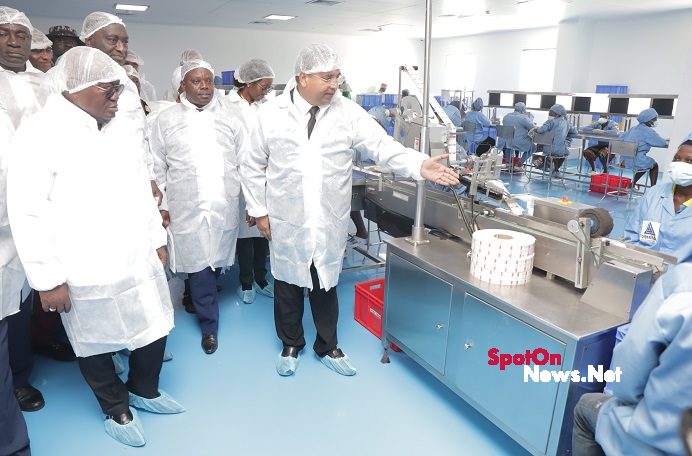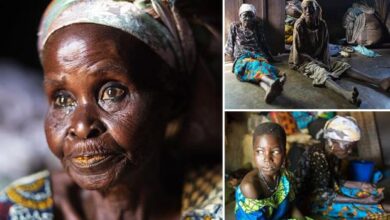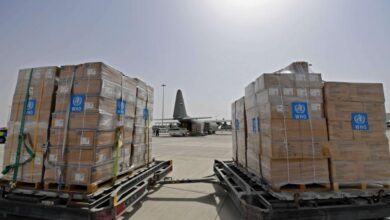Akufo-Addo inaugurates $35 plant for manufacture of pharmaceutical products

Akufo-Addo inaugurates $35 plant for manufacture of pharmaceutical products
President Nana Addo Dankwa Akufo-Addo on Friday inaugurated a $35 million pharmaceutical manufacturing plant at Larpleku, Ningo-Prampram for manufacture of serum and vaccines.
The plant which has one of the highest production capacities in West Africa is owned by Atlantic Lifesciences Limited, a pharmaceutical manufacturing company.
The company which is under the government’s One District One Factory Programme would begin commercial manufacturing of infusions, anaesthesia, vaccines and eye drops for the Ghanaian market as well as the West African region.
As part of the programme, the President also inspected Atlantic Lifesciences Limited’s serums and vaccines plant located at the same Larpleku factory site.
Inaugurating the factory, President Akufo-Addo said the establishment of the factory was a concrete manifestation of a new paradigm of economic development which government was vigorously pursuing to promote value addition and industrial activity within a conducive and business friendly environment.
He said the facility was a further fulfilment of the strides by the government in partnership with the private sector to set up at least one medium to large scale enterprise in every district in Ghana.
According to the President, while previous attempts of rural economic revitalisation in Ghana had focused mainly on the provision of physical infrastructural facilities, the 1D1F programme of his administration was focused on the provision and promotion of commercially viable business ventures to generate a sustainable and accelerated economic development in rural communities.
“Additionally the 1D1F will address the challenge of widespread poverty and underdevelopment among rural and periurban communities through the establishment of an institutional framework that will attract private sector investment and rural economic activities, create jobs and raise income levels,” he added.
President Akufo-Addo said the establishment of the factory would generate about 400 district direct jobs to the existing 380 jobs created by the industry.
He noted that out of the total of $35 million spent to establish the manufacturing facility some 10 million of the amount was provided for by government through the Ghana EXIM bank towards the purchase of plants, equipment and machinery.
President Akufo-Addo said the transformation of Ghana’s economy from one of the production and export of raw materials to industrially value added economy remained one of the central priorities of government and this would require among other things a vibrant investment climate and a robust regulation and incentive regime to support private investment in these strategic sectors.
The Minister of Trade and Industry, Mr Alan Kyerematen, said under the GhanaCare Obaatanpa programme, government through the Ministry of Trade and Industry would undertake activities to support the pharmaceutical sector to take advantage of the emerging opportunities.
The activities, he said, would include to upgrade pharmaceutical companies to achieve World Health Organisation’s global manufacturing standards, provision of management and technical assistant to enable the companies operate efficiently and establishment of a par equivalent sector to support the local pharmaceutical manufacturing industry.
He assured of government’s continuous support for pharmaceutical sectors to become more competitive both in the local and foreign markets.
The Deputy Minister of Health, Mrs Tina Mensah, said the establishment of the facility fell within government’s vision of securing the much needed vaccines through the domestic vaccine development in the short, medium to the long term adding that the Ministry was looking forward to collaborating with Atlantic Lifesciences Limited in the area of local development of vaccines and antiserum.
The Chief Executive of Atlantic Lifesciences Limited, Mr Dhananjah Tripathi, said the inauguration of the facility brought to five, the number of local infusion manufacturing industries in Ghana with an annual capacity of 133m bottles.
He said with Ghana’s annual requirements of infusion standing at 25m bottles, the companies were more than ready to supply the infusion needs of the country.
He, therefore, appealed to the government through the MoH to consider the restriction of importation of infusions to prevent these companies from competing with substandard and fake imports.








